Livedog2 Member Username: Livedog2 Post Number: 610 Registered: 03-2006 Posted From: 24.223.133.177 |
What is the history of the section of Detroit known as "Black Bottom"? What were its boundries? How did it get its name? Why did it get its name? Who are some of the notable people from that neighborhood? Any info would be appreciated. Livedog2 | ||
Kathleen Member Username: Kathleen Post Number: 1406 Registered: 10-2003 Posted From: 69.14.122.57 |
Paradise Valley/Black Bottom by Frank D. Rashid Frank Rashid is a professor at Marygrove and is active in their Institute of Detroit Studies. "Long-time Detroiters refer to the old African-American districts of Paradise Valley and Black Bottom as if they were interchangeable, but the terms actually refer to two different inner east-side areas sharing the border of Gratiot Avenue. Black Bottom, proceeding south from Gratiot as far as the Detroit River, was the older of the two. Paradise Valley-which attained its identity in the twenties, thirties, and forties-spread north with the growing African-American population from Gratiot along the major thoroughfares of John R, Brush, Beaubien, St. Antoine, Hastings, and Russell, eventually stretching to the area known as the North End, beyond the northern loop of East Grand Boulevard." More info is available at: http://www.marygrove.edu/ids/P aradise_Valley.asp | ||
Lmichigan Member Username: Lmichigan Post Number: 3971 Registered: 10-2003 Posted From: 24.11.154.56 |
Kathleen, that excerpt you posted was very interested and reminds me of how the city tried to relocate Detroit's Chinatown further north, but that eventually failed, too, as you can't magically just transport entire, authentic districts, without doing some real damage. | ||
Jams Member Username: Jams Post Number: 3486 Registered: 10-2003 Posted From: 68.248.81.155 |
Livedog2, You really need to learn how to use Google. First link on list when I typed in Black Bottom + Detroit then hit search. http://info.detnews.com/histor y/story/index.cfm?id=174&categ ory=life | ||
Livedog2 Member Username: Livedog2 Post Number: 613 Registered: 03-2006 Posted From: 24.223.133.177 |
You miss the point Jams! By the way did I kill one of your friends or relatives in the war? Livedog2 | ||
Detroitteacher Member Username: Detroitteacher Post Number: 80 Registered: 06-2006 Posted From: 152.163.100.8 |
I contacted a fellow teacher and asked her to join the forum and to post regarding the Black Bottom. She is extremely knowledgeable about the subject as well as many others. She's on vacation so not sure if she is available to post but I am sure she will if she can. | ||
Livedog2 Member Username: Livedog2 Post Number: 617 Registered: 03-2006 Posted From: 24.223.133.177 |
Thanks, Kathleen the info and link were helpful and informative. Livedog2 | ||
Livedog2 Member Username: Livedog2 Post Number: 618 Registered: 03-2006 Posted From: 24.223.133.177 |
Detroitteacher, I'm glad you're here! Livedog2 | ||
Detroitteacher Member Username: Detroitteacher Post Number: 81 Registered: 06-2006 Posted From: 152.163.100.8 |
Dog, you are too kind......other's aren't so glad I'm here.....HAHA My venom is coming out in other posts and it ain't pretty! | ||
Livedog2 Member Username: Livedog2 Post Number: 621 Registered: 03-2006 Posted From: 24.223.133.177 |
I noticed Detroitteacher but it's not worth it to get involved in those discussions because they are meaningless diatribes with irrelevant people. Stick with the threads that are interesting and where you get support. But, I know that sometimes it's hard to do because the "bushwhackers" are everywhere. Livedog2 | ||
Lilpup Member Username: Lilpup Post Number: 1173 Registered: 06-2004 Posted From: 69.130.18.100 |
Paradise succumbs to progress Is there anything about the neighborhood in or around the stadia as this article says was planned? | ||
Ltorivia485 Member Username: Ltorivia485 Post Number: 2732 Registered: 08-2004 Posted From: 69.17.38.195 |
Where was Detroit's Chinatown exactly? Seriously, I think Detroit needs to create ethnic neighborhoods (where the Belgians, Poles, etc. lived) across the city to attract people to relocate into the area. Detroit has a very long history, and these people's history should be recognized and cherished. | ||
Detroitteacher Member Username: Detroitteacher Post Number: 88 Registered: 06-2006 Posted From: 152.163.100.8 |
Ltorivia: The city HAD that at one time.....and that type of living was thought of as discriminatory......people can't cry segregation and equal all at the same time. I agree that the cultural history of Detroit needs to be recognized and cherished but having ethnic neighborhoods isn't the way to do it....at least according to the law. It really won't happen because of the negative attitudes of people about different cultural groups other than their own. Some on this forum that I have had experiences with seem to want Detroit to remain predominantly black and will not welcome (and will show this by their political affiliations, voices, negative comments, etc.) Sure wish it could be different but that is the vibe I get. | ||
Livedog2 Member Username: Livedog2 Post Number: 622 Registered: 03-2006 Posted From: 24.223.133.177 |
Maybe someone will figure out that ethnic neighborhoods are just as good and no more a threat than neighborhood schools if its not too late. CDB ruined neighborhoods and a whole city! Livedog2 | ||
Jams Member Username: Jams Post Number: 3494 Registered: 10-2003 Posted From: 70.226.45.232 |
How, if the City had the slightest interest, would these artificial recreations of ethnic enclaves be created? Those enclaves grew organically as residential, churches, and businesses were settled by the new immigrants in areas they could feel comfortable with others from the places they had emigrated. As they became Americanized, they and their children moved into the real melting pot of suburbia. The idea of an imposed "ethnic enclave" has as much to do with reality as a trip to Disneyworld. | ||
Livedog2 Member Username: Livedog2 Post Number: 623 Registered: 03-2006 Posted From: 24.223.133.177 |
So, what does that have to do with "Black Bottom." Another history thread highjacked by politics and do-gooders! Livedog2 | ||
Rasputin Member Username: Rasputin Post Number: 3725 Registered: 10-2003 Posted From: 68.74.31.233 |
Did any of you ever consider the fact that those buildings, the area, exploitation of history thru the WRITTEN word, etc. ain't very important to most Black People???? one hellalot of older Black Detroiters didn't consider the place a Paradise!!! It was just a place where the Jews would rent/sell to Blacks as they moved out!! Why the hell do you constantly think that we have all succumbed to "white cultural" values??? Go figure ..... on an ongoing "tradition of the Griot." Black-atcha ..... with plenty of knowledge re: Black Bottom/non-Paradise Valley (Message edited by Rasputin on July 08, 2006) | ||
Detroitej72 Member Username: Detroitej72 Post Number: 20 Registered: 05-2006 Posted From: 66.184.3.44 |
YEs Rasputin is correct. The Black Bottom was originally Jewish. Hastings Street was all Jewish until the early 20th centery. However Jews were the only ones willing to rent housing to the Blacks at that time. Thus began "The Black Bottom" even though few know that the real reason it was called such was beacause of the black fertal soil that was beneth everyones feet. It was thanks to the white establishment of the 50's with thier "urban renewal" aka "black removeal" that destroied the place were a person of color could feel like a real person without some white gorrilla busting thier chops. | ||
Detroitej72 Member Username: Detroitej72 Post Number: 21 Registered: 05-2006 Posted From: 66.184.3.44 |
BTW anybody know the Black Bottom Stomp?? | ||
Jimg Member Username: Jimg Post Number: 642 Registered: 10-2003 Posted From: 205.188.116.137 |
Arc Of Justice by Kevin Boyle has interesting information about Black Bottom, too... If you mean "Black Bottom Stomp" by Jelly Roll Morton (1926)...Great recording...supposedly named for a dance popular with black folks in Nashville, the waterfront area is/was called Black Bottom. Morton did spend time in Det in the late 'teens/early twenties, so who knows?. The song doesn't have lyrics but there is a different tune "Black Bottom" from 1926 which is said to be based on a dance by blues queen Alberta Hunter...'dragging one's feet through the muddy flats of a Southern river'... There is also a rec. by pianist Eddie Heywood (Sr.) from 1923 but haven't heard this - possibly a third tune. Maybe "Black Bottom" is generic? Or have I over-reacted and you are just asking about recordings associated with Det Black Bottom or Paradise Valley lol? (Message edited by jimg on July 09, 2006) | ||
Rasputin Member Username: Rasputin Post Number: 3727 Registered: 10-2003 Posted From: 68.74.31.233 |
Good post, JimG; although most of the Detroit Elders I talk with considered the "Black Bottom Stomp" the prelude to a ride in a "Paddy Wagon" with a white chauffeur dressed in blue wearing a copper badge!! Go figure .... The "bottoms" is generic code for the geographicical location or territorial spot where the land was cheap/no good and only "fit for Blacks!!" Most urban areas had a Black Bottom, and in Detroit it DID NOT refer to the richness of the soil as mentioned above. Black-atcha ..... | ||
Livedog2 Member Username: Livedog2 Post Number: 638 Registered: 03-2006 Posted From: 24.223.133.177 |
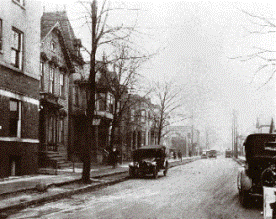 Black Bottom residential street on the east side circa 1920. The sign on the tree reads "Always Drive Safely." Paradise Valley and Black Bottom By Vivian Baulch / The Detroit News The 1910 census reported that Detroit's "Negro" population was 5,741 and owned 25 places of business. But the African-American community grew quickly as the city's booming auto industry attracted a flood of workers from around the nation and the world. By 1920, African-Americans owned 350 businesses in Detroit, including a movie theater, the only black-owned pawn shop in the United States, a co-op grocery and a bank. The community also had 17 physicians, 22 lawyers, 22 barber shops, 13 dentists, 12 cartage agencies, 11 tailors, 10 restaurants, 10 real estate dealers, eight grocers, six drug stores, five undertakers, four employment offices, a few garages and a candy maker. The community was centered on the near east side of downtown in the area of St. Antoine, Hastings, Brush, John R, Gratiot, Vernor, Madison, Beacon, Elmwood, Larned and Lafayette. It's not clear how the area came to be known as "Paradise Valley." Some have speculated that it drew its name from the newly introduced Asian "Paradise" tree that grew very easily along fences in the area. 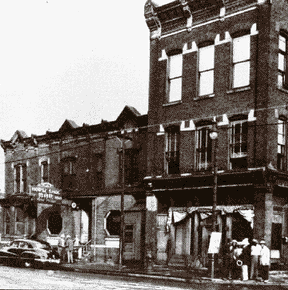 The 606 Horse Shoe Bar on E. Adams was a popular Black Bottom gathering spot. While life was often far from heavenly as the community struggled against discrimination and poverty, the neighborhood developed its own culture and attractions. Some of the popular clubs in the area included the Club Three Sixes, El Sino, Pendennies, 606 Horse Shoe, B&C Club, Congo Lounge, Gay 90's Club, Royal Blue Bar, and the Bluebird Inn. By 1936, the name Paradise Valley was firmly established and the neighborhood had its own informal mayor, Roy Lightfoot. The community also had its heros like Olympic star Jesse Owens, whose visit to the Valley inspired a celebration. And of course there was heavyweight boxing champion Joe Louis, the Valley's favorite son. His mother, Lily Brooks, lived on McDougall. The 1940s brought the end of the Great Depression and a booming job market in Detroit as the city first built the weapons to win World War II and then built the cars for the returning soldiers. Detroit's African-American community grew, too. 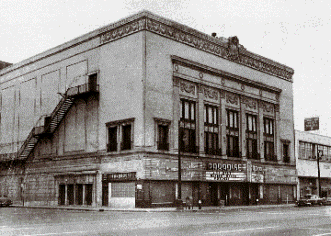 The Paradise Theater on Woodward, later restored as Orchestra Hall, featured all the top black entertainers of the era. In 1941, Orchestra Hall on Woodward and Parsons reopened as the Paradise Theater. It offered the best African-American musicians in the country. Duke Ellington opened Christmas Week with his big band. Admission was 50 cents, and patrons could stay all day. There were three shows a day with four on weekends. "B" movies were shown between acts. Those without the 50 cents were allowed in the back balcony door. The theater thrived for ten years during the glory days of jazz. It featured top entertainers: Ella Fitzgerald, Billy Eckstine, Billie Holiday, the Inkspots, Cab Calloway, Jimmy Witherspoon, Alberta Adams, Jitterbugs, Taylorettes, Kim Weston, Trick and Slick,Teddy Harris Jr., Dinah Washington, Josephine Baker, Big Maybelle, Little Willie John, Arthur Prysock, Illinois Jacquet, Nat King Cole, Count Basie, Duke Ellington, Sammy Davis Jr., Pearl Bailey, Joe Williams, the Mills Brothers, Charlie Gabriel, Dizzy Gillespie, Re Bop Orchestra, Louis Armstrong, Sonny Woods, Ann Baker, Luis Russell, Jay C. Higginbottom, Joe Garland, Two Zephyrs, Joyner and Foster, Maxine Sullivan, Bill Robinson, Jimmie Lunceford's band, Fletcher Henderson, Lionel Hampton, Erskine Hawkins and Charles "Lanky" Bowmans sextet. 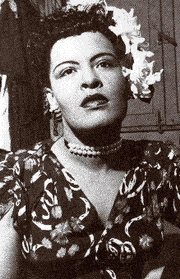 Singer Billie Holiday was one of the headliners who played the Paradise Theater. But the 1950s brought more competition, higher performer fees, television and changing tastes. Other places became more popular and took the crowds: The Graystone Ballroom, Music Hall and Olympia. Finally the last acts played: Johnny Hodges, the Orioles and Moms Mabley. In 1952, the Church of Our Prayer and Rev. James L. Lofton bought the theater for $250,000. Later abandoned, the building escaped demolition and was restored as Orchestra Hall, home of the Detroit Symphony Orchestra. Around the corner from the Paradise Theater was the elegant Gotham Hotel. The nine-story, 200-room inn was built in 1924 by Albert Hartz, who sold it to John J. White and Irving Roane in 1943. The entrepreneurs soon turned it into a social center for Detroit's African-American community. 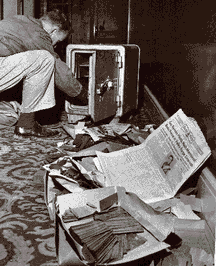 An agent of the Internal Revenue Service sifts through records in a safe found during a gambling raid on the old Gotham Hotel in 1962. Agents arrested 42 people including the hotel owner. Suites featured solid mahogany furniture and were named to honor Duke Ellington, Sammy Davis, Ray Robinson, Joe Louis, Lena Horne and Cab Calloway. After Roane sold out to White in 1945, the kitchen was renovated for $25,000. A small fortune kept fresh flowers in the Ebony dining room daily. Famous visitors at the Gotham Hotel included Jesse Owens, Joe Louis, Adam Clayton Powell, Langston Hughes, Sammy Davis and Billie Holiday. But the hotel fell on hard times and closed in September 1962. The following December, 100 federal, state and Detroit police officers raided a gambling den in the vacant hotel. The officers arrested 42 people including the owner, White. It was the largest gambling raid in Detroit up to that time. Police said the hotel was the center of a gambling operation that netted as much as $30 million a year. The Gotham later fell to the wrecker's ball -- the fate of most of Paradise Valley during the 1950's, 1960's and 1970's. Urban renewal projects like Lafayette Park, the Chrysler Freeway and the Elmwood housing project replaced the old neighborhood and scattered the residents. But the memories could not be demolished. The neighborhood has been celebrated in musicals like Bea Buck's "Paradise Valley Revisited" and "Masquerade Flashback," and recalled in Elaine Wood's book "Untold Tales, Unsung Heros." And the Valley lives on in the memories of the people who once lived there. 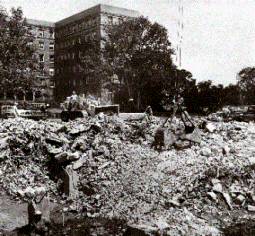 Workmen clear the rubble of the stately old Gotham Hotel at John R and Orchestra Place as urban renewal eats away at Black Bottom and Paradise Valley in the 1960s. Livedog2 |